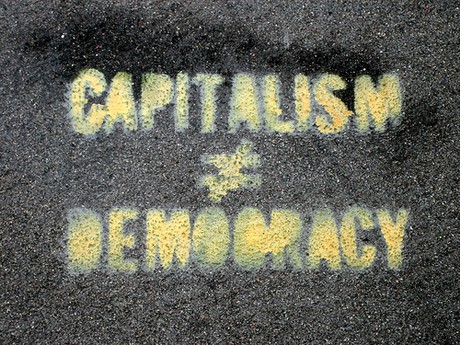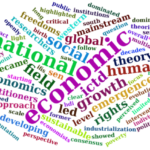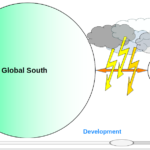The post-WWII era can be arguably defined as the golden age of democratic capitalism – at least from the perspective of developed or industrialized countries. Rebuilding Europe and pumping capital into Japan triggered a prolonged economic boom until the 1980s, notwithstanding the 1973 oil crisis. The fall of the Berlin Wall in 1989 opened new markets to capital investment and recruited new members to the democracy club, thus providing a much-needed second wind to the then-declining golden age.  During that same period, democracy, defined narrowly, continuously expanded in developing countries, including those that became independent nations in the 1960s/70s. By the end of the last millennium, analysts and observers were openly speaking about the third wave of democratization, subtly supported by a new round of technological innovation that took off in the 1990s.
During that same period, democracy, defined narrowly, continuously expanded in developing countries, including those that became independent nations in the 1960s/70s. By the end of the last millennium, analysts and observers were openly speaking about the third wave of democratization, subtly supported by a new round of technological innovation that took off in the 1990s.
The 2007-08 Global Economic Crisis surfaced deep scars that had remained primarily invisible until then. While almost no one saw it coming, the crisis cracked in the golden mirror virtually beyond repair. Inequality emerged as the indisputable champion of a new socio-economic situation that before seemed unfeasible if not impossible – or at best, somewhat typical of the 19th Century. The response to the new context, reflected by the rebirth of right-wing populism and pseudo-fascist movements, for example, has not been the promotion of yet another democratic wave. The clarion call today seems to be the opposite, as authoritarian regimes are rapidly gaining ground. At the same time, global capitalism has recovered fully and looks as vibrant as ever. But admittedly, version 2.0 of the golden age is not one of the options on the table. So, how did we get to this point? Can the golden age of democratic capitalism be replicated?
These are some of the questions that the latest book by Robert Kuttner, Can Democracy Survive Global Capitalism? Attempts to answer. Tracing the historical evolution of democratic capitalism is one of the tools the author uses to highlight its singularity. As Kuttner says: “The postwar system squared a circle” (pg. 23). The analysis starts with the 1929 Depression and the policies promoted by the Roosevelt Administration. WWII commenced before any global recovery happened. Only after 1945, when global peace was achieved, and a centrist version of the Bretton-Woods institutions was put in place, along with the United Nations, did the 30-plus years of democratic capitalism start. Kuttner argues that U.S. leadership was the prime mover of democratic capitalism. By the late 1970s, the tide began to turn, propelled by the neoconservative governments of Thatcher and Reagan and the birth of neoliberalism.
Kuttner identifies six core processes that led to the dismantling of the golden age of capitalism: 1. Global financial liberalization; 2. Weakening of labor and the social contract in the U.S. and Europe, respectively; 3. The right-wing turn of the center-left; 4. Global trade liberalization; 5. Tax reforms favoring corporations and the rich; and 6. Elite capture of critical global governance institutions. The book dedicates a chapter to each, except for point two, which is presented in two separate sections. The overall prime mover here is the liberalization of global finance, which empowered the elites associated with the sector to influence and eventually take over policymaking processes and dismantle or severely disable public institutions. In any event, these processes working together have provided fertile ground for the rebirth of right-wing populism and fascism across the board, including long-standing democracies in the Western World.
The book argues that the way out of this conundrum is progressive populism, which should not be confused with its right-wing version. The core issue at stake today is the protection of democratic societies from global crony capitalism, undermining public institutions at both the national and international levels. Kuttner then identifies six key policies that must be implemented to save democracy from the current onslaught. He sees the U.S. as the only nation that, as in the 20th Century, could lead this process and contribute to creating what he calls a “post-capitalist democracy.”
The author openly endorses Karl Polanyi’s critical perspective and uses Keynes and Marx as part of the supporting theoretical cast to make his case. I was surprised by Kuttner’s reference to Mikal Kalecki, a Polish economist who mixed Marx and Keynesian economics and has been credited with independently discovering the principle of effective demand.
Other contemporary authors such as Stiglitz, Robert Reich, and Paul Mason have presented similar perspectives. The overall argument seems the same: In the late 1970s, the financial elites could access critical policymaking processes and institutions and issued policies that undermined overall social well-being and democracy. Their differences are subtle and boil down to one fundamental question: Does free-market, unregulated capitalism lead to deep crises threatening democracy? Kuttner is obvious here with a resounding yes. This view is certainly not shared by some of the other authors, who instead argue that bad policies are what lead to undemocratic capitalism. Capitalism, deep down, is a force for good.
Human agency is perhaps one of the weakest points in this book. In Kuttner’s presentation, the key player here has been the state, particularly the U.S. national state, that created global democratic capitalism single-handedly. The economic crisis of the 1970s started to change this and ended up empowering free-market conservatives. How did this happen? What were the social mechanisms that allowed this to happen? Some sort of theory of the state is probably needed here, especially if we assume it plays a critical role in the process. The book offers a simplistic, instrumentalist view of the state instead.
The same goes for Kuttner’s proposal to promote a post-capitalist democracy. Again, a single state is called to take charge here. For starters, today’s global economic system is very different from 1945 or thereabouts. Nowadays, we have many other powerful states out there who will (and should) have a say here. Second, asking the U.S. state to deliver a post-capitalist global system seems unrealistic, given the country’s current context and the probability of a left turn. Third, if the real goal is a democratic society, why not empower other actors from civil society and build international multi-stakeholder coalitions that reverse the current trends and establish genuinely open and participatory democracies at the national level?
The current situation is indeed not new. Last Century’s interwar period saw a similar situation where free-marketers put finance ahead of democracy, with catastrophic results that led to the emergence of fascism and the 1929 economic collapse. History furnishes essential lessons that we certainly cannot ignore. Kuttner here quotes Mark Twain: History does not repeat; instead, it rhymes. Given the current context so accurately depicted in the book, this sounds a bit too poetic to describe a dire situation. History does repeat itself, first as tragedy, second as farce.
Can’t beat that.
Cheers, Raúl






